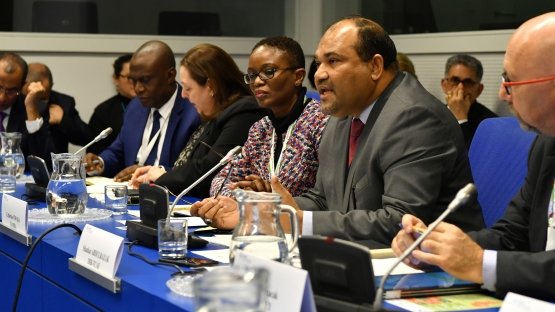Radiotherapy (RT) plays a central role in the treatment of cancer—more than half of all cancer patients will require radiotherapy at some stage during their fight against the illness. However, due to a shortfall in available RT facilities and professionals, public health officials are faced with many unresolved questions: How can we ensure access to radiotherapy services? And once established, how do we promote the sustainability of those services? These questions were central to the discussions of a high-level panel of cancer experts, who explored the subject during a side event of the IAEA Ministerial Conference on Nuclear Science and Technology.
Held on 29 November at the IAEA’s Vienna headquarters, and entitled ‘Sustainable Radiotherapy Services: Current and Future Challenges for Low- and Middle-Income Countries in Africa,’ the event was opened by Dazhu Yang, Deputy Director General and Head of the Department of Technical Cooperation. “The IAEA technical cooperation programme delivers extensive support to Member State efforts to address cancer. We currently support over 130 projects in cancer diagnosis, management and treatment, and we have delivered cancer-related assistance totalling more than € 300 million over the past three decades,” remarked Mr Yang.
Professor Benjamin Nyarko, Chairperson of AFRA, described the efforts made at the regional level to address the growing cancer burden in Africa. “AFRA’s strategic plan has both short, medium and long-term plans that will produce highly qualified experts and resilient infrastructure and equipment for the application of nuclear science and technology techniques for cancer diagnosis and treatment and human nutrition, which will benefit the AFRA region,” he said.
With an estimated shortage of approximately 5,000 radiotherapy machines in the developing world, the development of relevant capacities and the delivery of infrastructure to African Member States has become a priority for AFRA States-Parties.
“The need to address cancer in Zambia was driven by the fact that patients had to be sent abroad for treatment, for example, to Zimbabwe in the 1980s,” explained Dr Catherine Mwaba. “Only 350 cases, out of nearly 5000, were sent abroad for cancer treatment between 1995 and 2004.”
When plans are drafted for the construction of a new radiotherapy facility, discussions often revolve around equipment and technological specifications. However, for the delivery of comprehensive radiotherapy services, policy-makers must consider the sustainability of the facility by ensuring that the appropriate regulatory infrastructure has been established, competent human resources are available, and the relevant synergies with other medical disciplines are identified.
“When planning new centres or services for radiotherapy, it’s mandatory to have an optimal medical environment with pathology, radiology and surgery units,” said Dr Lotfi Kocabati. For this reason, the Jendouba Centre in Tunisia was designed to closely coordinate its work with the University Hospital of Jendouba and with other nearby health clinics.
In Zambia, these lessons are already being implemented: “Cancer treatment is becoming more integrated with other clinical disciplines,” clarified Dr Mwaba, “This ensures that all other diagnostic and treatment options are at least in the closest proximity, if not within the same institution.”
The discussions held during the side event sensitized policy-makers to the steps needed to successfully establish and sustain a radiotherapy centre within the African region. By integrating these lessons and experiences into future technical cooperation projects, the IAEA can better support the sustainability of radiotherapy services among its Member States.
The high-level panel was comprised of Dr Catherine Mwaba, Head of the Clinical and Radiation Oncology Section at the Cancer Diseases Hospital in Zambia; Dr David Atuwo, Director of Nigerian National Cancer Control Programme; Dr Lotfi Kocabati, a radiation oncologist at the Salah Azaiz Institute in Tunis, Tunisia; and Dr Yavuz Anacak, Head of the Radiation Oncology Department at the Ege University School of Medicine in Izmir, Turkey.
The event also benefitted from the participation of four Ministers: HE Mr Nabil Mohamed Ahmed of Djibouti, Minister of Higher Education and Research; HE Mr Francis Mokoto Hloale of Lesotho, Minister of Energy and Meteorology; HE Dr Ogbonnaya Onu of Nigeria, Minister of Science and Technology; and HE Nkandu Luo, Minister of Higher Education. The panel discussion was also attended by Ms Vivian Okeke of Nigeria, the Chair-Ambassador of the Vienna-Based African Group.





